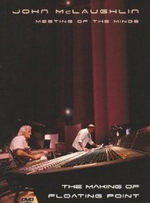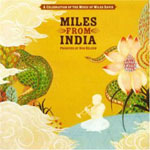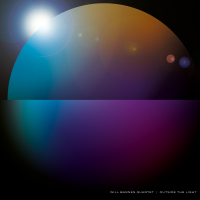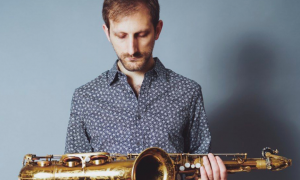Home » Jazz Articles » Interview » Ranjit Barot: Beautiful Collision
Ranjit Barot: Beautiful Collision

It was childhood friend Zakir Hussain who persuaded Barot to get out of the studios where he was earning his bread and butter, and realize his full potential as a musician. Barot toured with Hussain in the United Sates and went on to play with trumpeter Don Cherry and saxophonist Charlie Mariano, honing his craft and growing in confidence along the way.
For Barot, hearing the Mahavishnu Orchestra and Shakti as a teenager were life-altering experiences. The musical vision of McLaughlin and Hussain has influenced and shaped Barot's musical philosophy to a large degree, and has fostered and encouraged a musical duality that was inherent in Barot from the beginning.
Now Barot is venturing out as a leader and composer in his own right, 40 years after first picking up the drum sticks. Bada Boom is an exhilarating and ambitious offering, bringing together a string section, a horn section and an absolutely spectacular lineup of musicians. In addition to McLaughlin and Hussain, there are significant contributions from mandolinists U. Srinivas and U. Rajesh, saxophonist Tim Garland, bassist Matthew Garrison, djembe player and percussionist Taufique Qureshi, guitarist Wayne Krantz, pianist Gwilym Simcock and keyboard player Scott Kinsey.
Bada Boom also introduces several significant new voices on the Indian music scene, including a prodigiously talented 14-year-old bassist, Mohini Day. When such musicians come together, and when such rich and diverse musical traditions fuse under the guidance of Barot, it is indeed a beautiful collision.
All About Jazz: Tell us a little bit about your philosophy on making music and how this played in to the making of Bada Boom.
Ranjit Barot: I have always been conversant with the Western culture; I was born in England and lived there until I was about 12, and then I moved back. My mother was an Indian classical dancer, so I grew up with Indian music all around me in the house. I was going to this school which was predominantly Catholic, and all the affluent kids in the neighborhood were English-speaking and listened to rock and roll—this was all the way through my childhood. I was exposed to both cultures simultaneously, and I fitted in to both very comfortably. I can see the commonality between both cultures without having to force it or intellectualize it, and I think the music reflects that.
AAJ: In the liner notes of Bada Boom, you write about being able to have a glimpse of the oneness of all music. Could you expand on that idea, please?
RB: Yeah, and for that matter not only all music but all art, because if you take a group of musicians from all over the world and put them in the same room and strip away all the things like ethnicity—and what you are left with is intent and spirit—when you get to that point, then anything else becomes superfluous. That conversation, that feeling, is what we are really chasing.
AAJ: Is this oneness of all music something elusive? You talk of being able to have a glimpse of it, as though it's not that easy to find. Or is it something that we don't notice precisely because it's always before us?

RB: Yeah, it's about having the most meaningful conversation you can with other musicians. John [McLaughlin] says it a lot. He plays maybe 100 concerts per year, and he says it's only three or four times that he gets that feeling, and that's what keeps him going on and on: chasing that feeling. It's a kind of nakedness.
AAJ: In terms of the musicians on Bada Boom, you have a veritable embarrassment of riches, but let's start with John McLaughlin and Zakir Hussain. When did you first hear them, and how have they impacted you as a musician?
RB: Zakir is very close to my family. His father, the great Alla Rakha Khan, was very close friends with my mother, and they lived just down the road from us in Bombay. I was very lucky to spend some time with him and be exposed to all the rhythmic knowledge he had. When I went over there, I would see Zakir and the other brothers, but Zakir was the emerging star. He had already shown at a very young age that he was extremely blessed, so I was always in awe of him. Then when he and John came along with Shakti, I was completely blown away. Then there was the Mahavishnu Orchestra; this is music which shapes your life.
In India the culture is that when we are affected and influenced by musicians, they informally become our teachers and we respect them in that sense. It's not a casual thing. We take it very seriously, and as far as I was concerned they were my teachers. An automatic hierarchy was established in my consciousness about who these people were, and I really learned a lot from them. Then I got a chance to play with John, and that was a dream come true.
AAJ: The track "Supernova" is dedicated to Zakir Hussain's father, Alla Rakha Khan, of whom Mickey Hart of the Grateful Dead said, "He is the highest example of rhythmic development." Would you agree with that comment, and could you maybe explain it?

RB: Absolutely. Maybe you made the connect, but the whole album is scenes and events from the Big Bang onwards. "Singularity" is when the whole universe was a pinpoint; "T=0" was the birth of time; "Revolution" is the first time we experienced orbits within planets; "Supernova" is self-explanatory because Alla Rakha Khan has maybe gone away from this world, but he still illuminates our lives. We still feel his presence, stronger than ever. Not only was he a great, great musician and a rhythmic genius, but he was one of the most beautiful people I knew. He was a saint.
For me, that is really important. I mean, you can be a great musician, but if nobody can spend five minutes with you in a room, then that's a bit of a drag.
AAJ: Zakir Hussain certainly has all the talent of his father, and his playing on "Supernova" is wonderful, but it's maybe surprising that this is the only track on Bada Boom where you significantly employ a table. Is there a simple explanation for that?
RB: I don't really know. I'm a kind of a busy drummer and I'm not a fan of playing in big rhythmic ensembles all the time.
AAJ: So you felt there was enough going on there?
RB: Yes, I did. You know, there's so much Indian-ness going on in the album, and I didn't want to feature rhythm instruments all the time. This album is as much about my compositions as well as my ability to play the drums, and I think that's something I want to maintain. I don't want to be a drummer; it's my primary instrument, though I'm a musician who wants to compose meaningful music.
AAJ: You toured the States with Zakir Hussain in the Masters of Percussion tour. What was the setup and how was the experience?
RB: I started out playing drums, but for a long time I did the whole studio thing because, basically, I had a family to support and I wasn't making any money from playing drums, man. Zakir Bhai invited me to play at a gig in Bombay, and he told me that it would be a shame if I didn't get out there and play. That was a big judgment for me that he thought I was talented enough to get out of the studio and go out and play. He kept pushing me back to playing drums, and one day he said, "We're going on the road."
That was a demanding tour, especially coming on after him, because he goes on stage for an hour, and he kills it, man. He says pretty much everything that needs to be said. You end up thinking, "Well, what am I going to do now?" At one gig, I said to him, "I've got a great idea for the next gig." He thought I was coming up with a new arrangement, and I said, "You should play last." That way, I could have some sort of respectable moment on stage, because after that guy it's over, you know?
He's extremely encouraging, and I owe a lot to him to be doing what I'm doing right now.

AAJ: You played on John McLaughlin's Floating Point (Abstract Logix, 2008), an experience which you described on A Meeting of the Minds—The Making of Floating Point (Abstract Logix, 2008) as the best five days of your life. How did the experience of recording Bada Boom compare?
RB: I'd got my drumming back together and I was feeling better about myself, and then I get a call to play with John McLaughlin. I told myself, "Don't piss it away, man." I learned the songs and I was prepared to do my best. When I got there, the thing that got me was how generous John is with space; you had all this space to do whatever you wanted. You've grown up listening to a guy your whole life, and he's played with my favorite drummers—Billy Cobham, Narada Michael Walden and Tony Williams—and here he is behind the glass looking at you as you're recording something. It was surreal, quite surreal.
For those five days, most of what he did and said validated a lot of what I felt as a musician and as a human being. That was the best thing. It's great to have your mentors validate you in that respect, and also believing in the same things you believe in, which makes you think you're not so far off in your thinking. It was magical.
My album, on the other hand, was something that had been brewing inside me for a while. I live in a country where the film industry and film music is really the biggest thing, and I'm not allowed to work creatively in those areas; it's very narrow. So ever since I played with John, I had been affected, basically, and needed to do something meaningful. I went about casting musicians for each song, and I'm lucky that I got pretty much everyone I casted. I was so intent and focused on it, and when I was finished I looked back on it, and yes, I was extremely happy that I had done something meaningful.
 AAJ: Were these compositions something that you had been carrying around for a long time, or were they something that you sat down to compose afresh once you'd decided to make an album?
AAJ: Were these compositions something that you had been carrying around for a long time, or were they something that you sat down to compose afresh once you'd decided to make an album? RB: I started the process about a year ago, so they're all fresh songs. Conceptually, what I wanted to do with the rhythmic structures had been running around in my head for a while, but I guess when I sat down to write a year ago, I wrote a bunch of new tunes.
AAJ: Most of the musicians on Bada Boom are well known, and they all play beautifully, though one who stands out is pianist Harmeet Manseta. What can you tell us about him?
RB: He's a young pianist from Bombay. He's just outstanding. He's such a beautiful guy and an extremely talented pianist. He's very knowledgeable, and I couldn't have done the album without him. I don't read and write; all my harmonic and melodic ideas are from the mind, and I externalize it on the piano. The whole depth of harmonic knowledge of Harmeet was an integral bed on which I superimposed my ideas, and we worked very closely together on that. Harmeet is an incredible musician.
AAJ:M Yes, his playing is fantastic throughout the album. Let's hope we hear more of him in the future.
RB: Oh yeah. I will make it a point, man.
AAJ: A relatively new name for many people is guitarist Marc Guillermont. How did you come across him?
RB: It's funny, while other people go and watch TV, I go onto the Internet, and I got so inspired by some of the musicians I see. I was just randomly looking at stuff, and I came across a video of John McLaughlin playing with three other guitarists, one of whom was Marc Guillermont. He wasn't intimidated, and I wanted to know more about him. He's a phenomenal composer and a great guitarist, and we connected on the internet. I just love his playing. He plays with [drummer] Gary Husband and with a drummer living in England called Sebastien Cornelissen.
We Skyped each other and sent the song back and forth, and it was wonderful.
AAJ: It's quite an ambitious album for a debut as leader—you have strings in there, a horn section and a cast of musicians as big as a Bollywood epic. Did it ever seem a daunting project to you?
RB: To reproduce this live on stage is going to be a trip. Being new, I'm not going to get a million dollars to put together a 15-piece band to go out on the road. There are ways to reproduce it if you have a good quintet, but I don't want to play it like the album. Maybe we'll strip it down to its core and play it differently, sort of unplugged. The album is done. It has a life of its own, and I have no interest in trying to play it exactly like that. This was my real primal scream.
I'd love to have done film scores like this. We could do so much more in Bollywood; we should be making great music and making great films. I was hearing all this and I wanted to put it all on the album. I wanted an orchestra and I wanted the horn section, and I want it to be big and bold and absolutely in your face.
AAJ: You've talked about Harmeet Manseta, but how much of a collaborative effort were the four co-arranged tracks with Manseta, Sanjay Divecha and Tim Garland?
RB: Very closely. I would sketch the melody out, and we would try and harmonize it. In Indian music, a lot of music is played in modes, or what we call a raga—a fixed set of notes in a scale. Now, a lot of musicians don't play chromatic— they don't play in between those notes. The modal game is to play those notes and only those notes, so we had to be very careful when we harmonized this stuff, we complemented anything that they would play. If we put a bunch of chord changes in there that they couldn't connect with, then you know, we had to really think, "How do we color this music?" Harmeet was hip to the Indian system; he's a genius.
It was almost like I was almost like I was playing Harmeet. He would spend nights with me listening to chords, and I was saying, "No, that chord is too dark. Let's brighten it." He was extremely accommodating; somebody else might have told me to piss off. He knew what we were chasing. He knew that this was a quest to find the way to tell the story.
 AAJ: Tim Garland plays just great on the three tracks. How did you hook up with him?
AAJ: Tim Garland plays just great on the three tracks. How did you hook up with him? RB: It's funny, man. As a musician, there are all kinds of things you have to do to pay the bills. I was doing a corporate gig for an airline. They called me up and told me they were adding new routes to London: one to Dubai and one to Hong Kong. They wanted to do a concert with eminent musicians from these three countries. I didn't know anybody in China, and they got somebody for me. I knew somebody in Dubai who was an Arabic blues player, and I asked my friend Peter Lockett, the percussionist, but he said he wasn't free. He told me the guy I should be looking at was Tim Garland.
I got in touch with Tim, and he came down for the corporate show. He flew down, and we connected instantly. Let me tell you, the secret to making a good album is to surround yourself with people who are going to make you look good no matter what you do. Tim is one of those guys, and he is just a monster arranger. He listened to "Dark Matter," and he said, "You should do a big-band arrangement," and he had a horn section. I said, "Here are the files; here are the songs. You do it and send it to me." I know that he sketched a part of it with Harmeet, and Tim just expanded on that.
AAJ: It's a fantastic track. The drum intro is reminiscent of Billy Cobham.

RB: Yeah, it was a slight tip of the hat to Billy. It was. And you know, the bassist on "Dark Matter" is 14 years old. I met her when she was 13, when her father introduced me to her in the studio. We did some gigs together, and it was just the most incredible experience to see a 13-year-old girl on stage, who was looking me in the eyes and holding me note for note. Then she came on her 14th birthday and played the rest of the song. She nailed that song. I'm looking to do a lot of projects with her. I want her to explode onto the scene. I think in another couple of years she will just be unstoppable. She's going to be a great musician.
AAJ: That's amazing. Changing subject a little, who are the drummers who have most influenced you?
RB: Billy Cobham, Tony Williams, Elvin Jones, man, for the jazz he was a big influence. He took the sort of approach where he would play over the byline, and he was so free. Another person was Jack DeJohnette—another big influence on me. Because I came from the jazz-rock world, Cobham was really my first big influence. The thing that struck me—and it's true in all great drummers, but especially Billy... You know, in India we have a great vocal tradition and the Western world doesn't have this vocal tradition, and drummers have the ability to emulate speech, and Billy was the first drummer I heard who was talking. I was floored when I heard him the first time. I could hear him talking. I look for that in players.
I've also been influenced by unknown guys—I can take something away from a gig. We are a collective; we are influenced by other people and then put our DNA on it and put it back out. That's the really beautiful thing about art—we cannot really claim ownership to anything because it comes from so many places. It would be arrogant to do so, in my opinion. It comes from so many places, and I have so many people to thank.
AAJ: You mentioned the rich singing tradition of India, and your own singing on Bada Boom is very impressive, particularly your konnakol. Is that something you learned as a child?
RB: Not really as a child, because I was too busy playing soccer. It came much later in life. The funny thing is, as I was growing up, I had all this Indian music around me, but really I wanted to play drums. I was playing rock and roll, I was playing Led Zeppelin, I was playing in a cover band in school. There was no inclination in my psyche at all. Then it's like I came full circle. It started to make sense. I realized that there's a rich tradition in my own country, and I became drawn to the harmonic and rhythmic accents of my own country. I'm as much a student of Indian music as any Western drummer. I have a slight advantage because I'm able to listen to it and internalize it and deconstruct it very quickly—it's in my psyche, it's a part of my consciousness. But when it comes to physically interpreting the Indian rhythms on the drum set, I'm like any Western drummer; I have to figure out the physicality of it and the mechanics of it.
AAJ: Is konnakol something you have to constantly practice like any instrument, or is it something that, once internalized, you never forget?
RB: You have to practice. Anything which requires muscle movement, you have to do over and over again, like an athlete. Even your facial and mouth muscles have to be familiar with those sounds and shapes. You'd better keep doping it, or you will lose it. I'm still very early in my konnakol training. The really fast parts I struggle with sometimes. The truth is, I don't practice enough.
AAJ: Coming back to Bada Boom, you dedicate "Revolution" to saxophonist Charlie Mariano. What was your relationship to him?
 RB: Charlie was a very, very good friend. I loved him dearly. We did a European tour together once. It was a big learning experience for me. He taught me the whole thing about dynamics. He'd come back stage and say, "Ranjit, I love playing with you. You're one of the most beautiful drummers," and I'd be so humbled because he's played with some of the greatest guys. Then the next gig, he'd come backstage and say, "What's wrong with you, man? Why are you playing so loud? Do you think I'm deaf?" He was teaching me. I was learning to listen, and most of playing together is listening.
RB: Charlie was a very, very good friend. I loved him dearly. We did a European tour together once. It was a big learning experience for me. He taught me the whole thing about dynamics. He'd come back stage and say, "Ranjit, I love playing with you. You're one of the most beautiful drummers," and I'd be so humbled because he's played with some of the greatest guys. Then the next gig, he'd come backstage and say, "What's wrong with you, man? Why are you playing so loud? Do you think I'm deaf?" He was teaching me. I was learning to listen, and most of playing together is listening. When I heard that traditional tune, a traditional south Indian tune played at the temple, I thought I'd dedicate it to Charlie because Charlie had been learning Nadaswaram [a hardwood wind instrument] in south India. When I got down to doing it, I met my friend Amit Heri—who's on the album as well—and he knew Charlie very well. Amit told me, "It's funny you should choose this tune, because that was Charlie's favorite tune on Nadaswaram." I had no idea. It was really very poignant.
AAJ: An odd coincidence, for sure. You reinterpret a couple of traditional Indian songs on Bada Boom. Is there a lot of musical experimentation going on in India, fusing the traditional music with other forms of music?
RB: Yeah, there is, in all sorts of genres. The most common trend for the commercial mainstream, whether it be films or whatever, is taking rural folk songs. We have a rich tradition of rural folk songs, and the thing about Indian folk songs is that it's not primitive—it's highly evolved. The folk music, which we really don't know who the author is, becomes public domain, and it's easy to mess around with without copyright and intellectual property stuff getting in the way. Loosely interpreted, it's plagiarizing folk music, but there's a lot of experimentation around, especially on the young, electronic scene. There's some interesting stuff happening.
AAJ: You were the music director for the opening and closing ceremonies of the Commonwealth Games, which were held in Delhi in October 2010. How was that whole experience?
RB: It was extremely exciting, something of such magnitude. Just logistically, there are so many people involved—choreographers, an event manager, a creative consultant, the government and ministers. Dealing with that was tiring; the music was easy. It was an extremely enriching experience.
I went to the rehearsal in Delhi and some of the folk musicians I met—man! I met one tribal group—they had finished rehearsals and they wanted to sing a song for me, and basically it was the blues, man. This is a tribe from central India, you know? Where did they know about the blues? It was the same scale, the same thing. I am now instilled with a burning desire to take a camera and a recorder and travel India. That's what I want to do for the next year.
AAJ: Don't forget to take your drum kit.
RB: Oh yeah, [laughs]. There is just so much music, man.
Selected Discography
Ranjit Barot, Bada Boom (Abstract Logix, 2010)
Henrik Anderson, Indian Heartbeat (EMI / IndiaBeat Records, 2010)
John McLaughlin, Meeting of the Minds—The Making of Floating Point (Abstract Logix, 2008)
John McLaughlin, Floating Point (Abstract Logix, 2008)
Various Artists, Miles from India (Times Square Records, 2008)
Ranjit Barot, Seduction (Music Today, 1997)
Photo Credits
All Photos: Courtesy of Ranjit Barot
Tags
Ranjit Barot
Interview
Ian Patterson
john mclaughlin
Zakir Hussain
Don Cherry
Charlie Mariano
Mahavishnu Orchestra
Shakti
Tim Garland
Matthew Garrison
Wayne Krantz
Gwilym Simcock
Scott Kinsey
Mickey Hart
Billy Cobham
Narada Michael Walden
Tony Williams
Gary Husband
Pete Lockett
Elvin Jones
Jack DeJohnette
PREVIOUS / NEXT
Support All About Jazz
 All About Jazz has been a pillar of jazz since 1995, championing it as an art form and, more importantly, supporting the musicians who make it. Our enduring commitment has made "AAJ" one of the most culturally important websites of its kind, read by hundreds of thousands of fans, musicians and industry figures every month.
All About Jazz has been a pillar of jazz since 1995, championing it as an art form and, more importantly, supporting the musicians who make it. Our enduring commitment has made "AAJ" one of the most culturally important websites of its kind, read by hundreds of thousands of fans, musicians and industry figures every month.





















